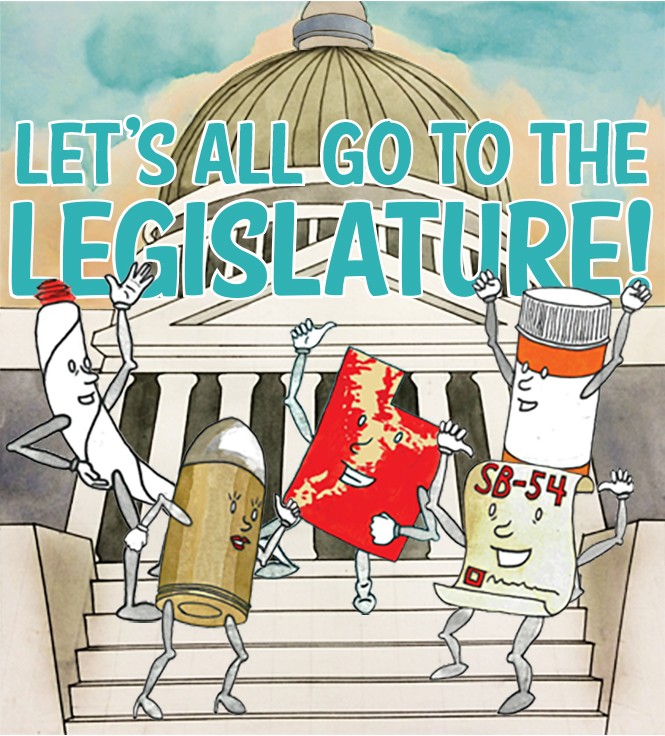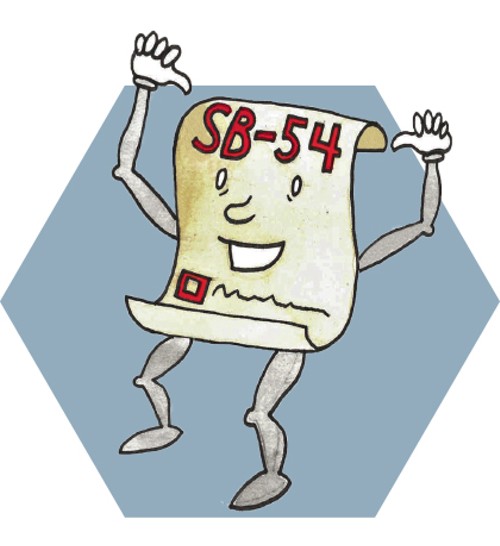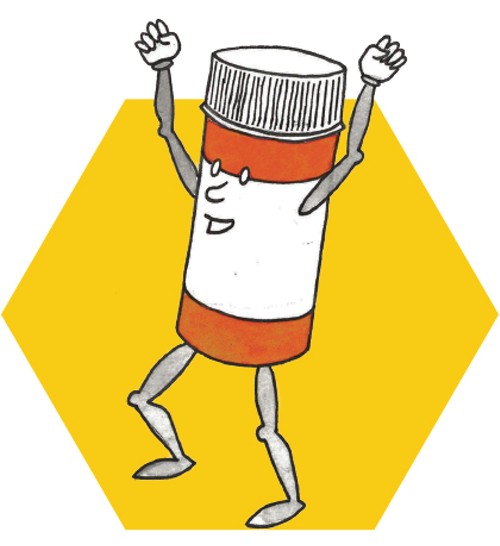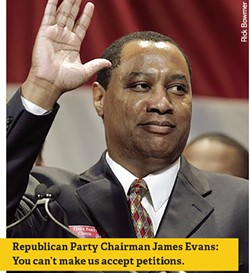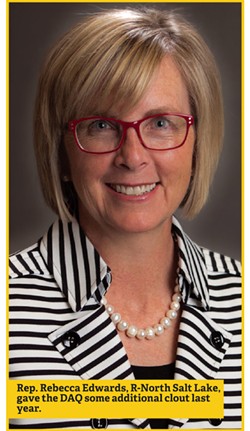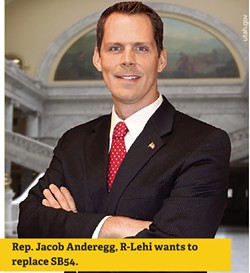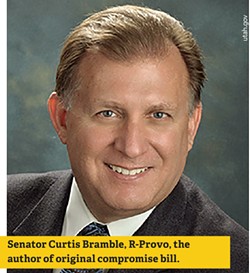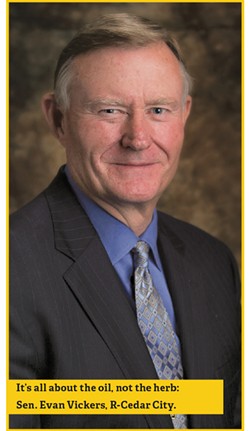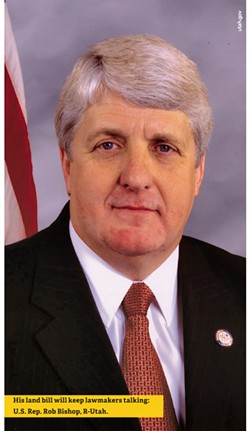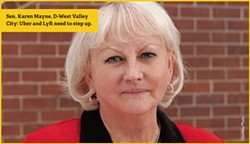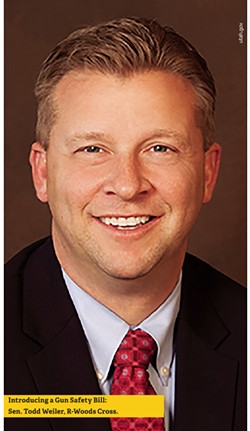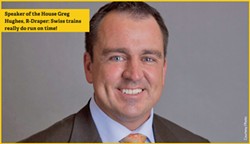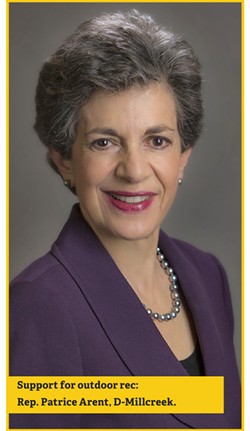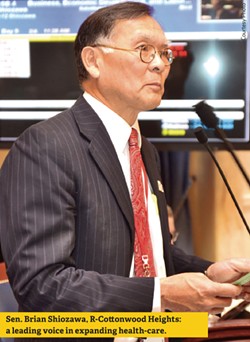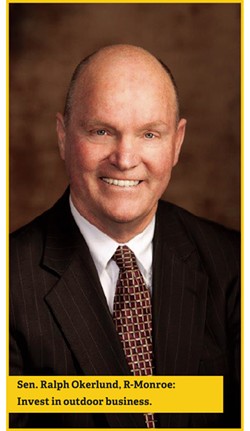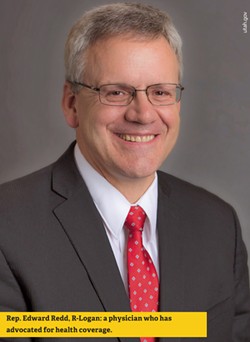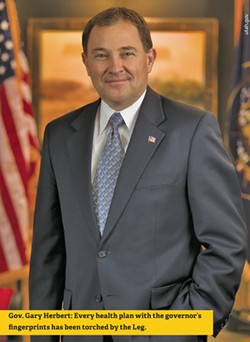Let's All Go to the Legislature!
Forty-five days. More than 1,200 proposed bills. Tons o' fun.
By Colby Frazier @colbyfrazierlp and Eric Ethington @ericethingtonForty-five days of politics, government, lawmaking and legislating kicked off in Salt Lake City on Jan. 25, when 104 elected members of the Utah Legislature convened on Capitol Hill.
For most people, this announcement—and the Legislature itself—are the stuff of big, fat yawns. Apathy, boredom, frustration and plain ol' who-gives-a-damn are four counter-thoughts that could easily accompany the first sentence.
But without trying to sound too preachy, every single Utahn should pay some attention to this annual gathering of the powerful. These 104 politicians—88 men, 16 women; 17 Democrats and 87 Republicans—are, each and every one, hell bent on passing a flock of new laws that will have certain impact on daily life in the Beehive State.
Sure, many legislators will advocate for new laws that will benefit their campaign donors. Many will advocate for what will benefit them, their companies and their friends' companies. Some will be guided by the push and power of high-paid lobbyists. But these men and women are supposed to be working for all of us—and it's up to voters to let them know that.
The entire spectacle is a lot like a 45-day film that unravels one minute at a time, and some of what occurs happens in the open, in votes in gilded rooms that are open to the general public.
Still yawning? I don't blame you. But consider that a second effort at legalizing medical marijuana could take center stage this year. Consider that for more than two years, big, brave politicians—many who enjoy government health-care plans—have been promising health-care reform while roughly 60,000 Utahns remain uninsured, and, in some cases, die because of lawmakers' inaction. Consider that more than 30 million acres of largely pristine public land that belongs equally to every citizen of this nation—the places you camp and hike with your family, deer hunt with your father and go ATV riding with your cousins—is being squabbled over by these power players, many of whom want to privatize, mine, drill, log and blemish wide swathes of it. Consider that $14 million in taxpayer money could be given to attorneys to sue the federal government in your name to take state control of this land.
You could sit down and consider all of these things for days, weeks and months. What we all need to do, though, is start paying close attention to what lawmakers are doing on our behalf. And if you don't like the smell of what's emanating from within that granite fortress at the tippy-top of State Street, you owe it to your family, your neighbors, to Utah and to yourself to do something about it.
With that, here is City Weekly's annual issue dedicated to all things Legislature, wherein we present a slice of proposed legislation that we think should be on your radar. If we managed to pique your interest, visit CityWeekly.net during the session for regular updates on bills and other happenings. You can also visit the Legislature's website, Le.Utah.Gov, which features an easy-to-use calendar of all of the hearings.
—Colby Frazier
Legalizing Medical Marijuana
Some background: Marijuana and Sen. Mark Madsen, R-Saratoga Springs, would seem to go together about as well as refrigerated beer and a Utah State liquor store: never, not ever. But Madsen, a libertarian-leaning conservative whose Mormon credentials are written in stone with the stature of his great grandfather, the Church of Jesus Christ of Latter-day Saints prophet Ezra Taft Benson, might know more about marijuana and how it pertains to this Promised Land than any living human.
In 2015, Madsen broke unchartered waters when he introduced a bill that aimed to legalize medical cannabis in Utah. It caught more traction than many believed it could, passing its Senate committee but failing by a single vote to advance from the Senate floor.
This year finds Madsen returning to the Capitol with a revamped marijuana bill, based upon about 365 days of intense research that took him to many of the 24 states that offer marijuana as medication to those suffering from pain. This year's bill, Senate Bill 73, clocks in at around 1,100 more lines of text that its predecessor, and covers in detail the ways in which marijuana will be cultivated, processed and dispensed to the estimated 80,000 people, or roughly 2 percent of the state's population, who need it.
"We've gone through and tried to learn from the other states," Madsen says, explaining that he visited farms in Arizona and Connecticut where medicinal marijuana is legal. "Even though [the bill is more restrictive], it's clear and it's common sense and the feedback we get from the industry is very positive."
Madsen's bill outlines the manner in which dispensaries will be able to sell marijuana (nothing smokeable), how much those carrying a prescription can purchase, and where they can sell it. He says dispensaries, which would be privately operated—unlike the state's liquor stores—would be allocated based on population densities of 200,000 souls. This means that any county with 200,000 people would get at least one dispensary, while Salt Lake County could end up with a handful.
These nuts and bolts, regardless of how well put together, will most likely get scrambled as the bill climbs the steep slope to approval. During the past year, Madsen has wrangled an array of support from a diverse cross section of the population who prefer pot to opiates to treat pain. Many other advocates say cannabis is the most effective treatment for their epilepsy, cancer and other ailments.
Stories of Utahns who have become sick and found that cannabis helpful are too numerous to tell. Indeed, this is also Madsen's story. After years of fighting his back pain with opiates—and a brush with death as a result of an accidental overdose—Madsen says his experience with cannabis has been 100 percent positive. No longer does he suffer from weeks of opiate withdrawal, nasty intestinal side effects or the numbing haze of a heroin-like high.
Madsen, and many of the advocates for legalized medicinal marijuana, also don't want to be criminals—a reality that Madsen has become acutely aware of as opposition to his bill from the law-enforcement community has mounted and helped to galvanize a separate pot bill that will also be heard during the session.
"For my case, it's a terrible situation to be in, where, yeah, I can keep getting opiates, and I can keep taking them and dealing with the side effects," Madsen says. "Or I can go with this more healthy alternative and risk everything. They would love to 'perp-walk' me—discredit me. I have to be very careful about what I do in state and what I talk about." (CF)
Senate Bill 54
The gist: The Utah Republican Party could find itself in trouble come Election Day if party leaders disqualify candidates who take the Senate Bill 54-prescribed petition route, unless the Legislature makes changes to the 2014 compromise law.
Lawmakers intended 2014's SB54 as a compromise between the Republican Party's desire to stick with the caucus-convention system and the Count My Vote (CMV) initiative that would have created a direct primary (allowing Utah's 650,000 unaffiliated voters to participate in the primary election of their choice). In late 2014, the Utah Republican Party sued the governor, arguing the state shouldn't have a say in how political parties choose their candidates.
In Nov. 2015, U.S. District Judge David Nuffer ruled that the Republican Party cannot be forced to allow unaffiliated voters to participate in their elections. However, candidates can still appear on the primary ballot through the signature-gathering process—collecting signatures in their districts who will support their candidacies—if those signatures are from registered Republican voters in that district.
That ruling has set off a new firestorm, as Republican Party Chairman James Evans signaled that the party may disqualify candidates from appearing as Republicans on the primary ballot, even if they've collected enough signatures, if they don't also successfully win at least 40 percent of the delegates' votes at the Republican Party's convention.
Mark Thomas, chief deputy to Utah's lieutenant governor and director of elections in Utah, told City Weekly in December that if the Utah GOP disqualifies a candidate who collected enough signatures, it could trigger a downgrade of the entire party's status to what's known as a Registered Political Party [RPP]. And if such a downgrade were to occur, every Republican candidate in the state who didn't collect signatures could find themselves removed from the ballot, because an RPP can accept only signature-gathering—not convention nominations.
Per the Utah elections website as of Jan. 25, 38 of the incumbent Republican representatives and senators who are up for reelection this year have registered to collect petition signatures. So has Sen. Mike Lee and Gov. Gary Herbert.
Rep. Jacob Anderegg, R-Lehi, has filed a bill that would essentially repeal SB54, returning Utah to the previous system where only a few thousand Republican delegates get to pick which candidate will appear in GOP primary elections. He could face an uphill battle with his bill, however, as the more-senior Sen. Curtis Bramble, R-Provo, who was the author of SB54 in 2014, will likely oppose any such attempt.
Count My Vote, the initiative that sought to do away with delegate nominations, has argued that the convention system shuts the average voter out of the process, in part because Utah leans so heavily Republican that the primary election is frequently the only election that matters, and letting delegates alone make that choice is unfair.
Several other bills could potentially alter or modify SB54, but as of press time they only exist as bill titles, and the content is not yet publicly available.
—Eric Ethington
Public Lands
Why now? With armed vigilantes occupying the 187,767-acre Malheur Wildlife Refuge in Oregon, the U.S. Department of the Interior halting new coal mining leases on federal lands and Utah Rep. Rob Bishop at last releasing his "grand bargain" on the state's public lands, 2016 would appear to have all the makings for a vitriolic public lands brawl at the Utah Legislature.
But as of this writing, a single bill, HB135 from Rep. Lynn Hemingway, D-Millcreek—which would grant free admission to state parks for certain disabled veterans—is on the docket beneath the public-lands category.
What this lull in the action means is up for debate, but it could be little more than a minor calm interlude before the Utah Attorney General's Office initiates what is expected to be a $14-million lawsuit against the federal government, demanding that it hand over its 31 million acres of federally managed public land in Utah.
In early December, the Utah Commission for the Stewardship of Public Lands, acting on the advice from a New Orleans-based law firm that was paid $500,000 to analyze Utah's case, voted to initiate the lawsuit. But the final word still rests with the AG's Office, which has not yet publicly said whether or not it intends to act.
In the meantime, on Jan. 20, Congressman Bishop released his long-awaited Utah Public Lands Initiative. The initiative, which he says will be introduced to Congress in the near future, is the result of more than 1,000 public meetings. Proponents say it is a valuable compromise that will protect beloved patches of the state, such as the San Rafael Swell and Cedar Mesa, while expediting drilling and development in other areas.
But wilderness advocates blasted the bill as being too friendly to development interests. While the draft bill touted myriad statistics on the acreage that would be protected, the section titled "Long-term energy development certainty" is vague about how it would "promote domestic energy production and job creation in eastern Utah..."
While acreage isn't specified in this section, and no map was present with the bill to paint a clear picture, the bill says that lands promoted for energy production would include wide swathes of BLM land across six counties.
Bishop's bill, and the possibility of the State of Utah suing the federal government for the land that belongs to every citizen of the United States in equal measure, will be more than enough to keep the sound bites flowing from the Legislature's Natural Resource, Agriculture and Environment committee.
Even with a lack of flamboyant bills aimed at federal land managers, Utah lawmakers like Rep. Ken Ivory, R-West Jordan, and Rep. Mike Noel, R-Kanab, will be able to kick back and view Bishop's shot at public lands in Washington, and the increasingly dangerous situation in Oregon, from a safe distance, knowing that they've tossed as much fuel on these fires as anyone. (CF)
Teach Gun Safety
Some context: In 2011, Utah became the first state in the Union to designate its own official firearm: the Browning M1911 semiautomatic pistol.
This fact is useful to Utahns in 2016 because President Barack Obama, whom many gun-loving Americans believe could still somehow revoke their constitutional right to bear arms, continues to occupy the White House, where his two-term tenure has been a massive boon to arms manufacturers.
In the wake of massacres in Paris and San Bernardino, Calif., Obama announced that he would do everything he could before his time in office expires to achieve stricter background checks for firearms sales.
In Utah, some legislators have also decided to do something in response to the cascade of mass shootings and killing sprees that have become about as American as the Super Bowl.
Sen. Todd Weiler, R-Woods Cross, has introduced Senate Bill 43, which would create a pilot program in some Utah public schools where eighth graders would be taught about firearm safety and violence prevention.
The courses, Weiler says, would be voluntary and no firearms would be present as part of the instruction.
Weiler says the instruction is not in response to fears of heightened federal regulation, but rather a needed piece of the education puzzle that he hopes would help cut down on the number of accidental gun deaths. And, like sex education and other sensitive topics that surface in the context of educating students, Weiler says it would be nice to believe that all parents who own firearms ensure that their children are educated on what they should do if they encounter a gun—but he doubts that this is the case.
The course would also prep students on how to handle an active-shooter scenario—knowledge that Weiler says couldn't do any harm if such a situation were to occur in a Utah school.
"I think some students would have the right instincts and some would have the wrong instincts," Weiler says. "It's always helpful if you could go through what you would do if you faced a scenario before it happened."
Weiler says he's fielded some criticism for the bill, but not what one might expect. He says many have told him this training should start at younger grade levels.
Motivation for the bill, he says, was spurred by the accidental shooting death in 2014 of a 12-year-old Kaysville girl. The girl was shot by her 10-year-old sister, who found a 9mm pistol at their home.
In a world with state-designated handguns, guns flying off the shelves like candy bars and gun violence prevalent in entertainment, Weiler says his bill is a far cry from a fearful reaction to gun violence. "I wish that little kids were a little more afraid of guns than they seem to be," Weiler says. "The gist of this [is] education: If you come across a gun, don't pick it up; don't touch it, just call for help." (CF)
Medicaid Expansion
In a nutshell: Lawmakers have spent years making Medicaid-expansion proposals and then shooting them down. Could the Legislature finally pass something this year to cover the thousands of Utahns who have coverage? Yes. But don't count on it.
It's been years since Utah lawmakers, having rejected the full Medicaid-expansion provision of the Affordable Care Act, were first tasked with coming up with an alternate solution to provide health care for the estimated 50,000 to 60,000 people who cannot afford or otherwise cannot get private health insurance. Many of these people are from working families, who earn a paycheck but are making too little to afford the often-expensive private coverage, but make too much to receive tax credits through Obamacare.
In the past few years, numerous proposals have been made by the governor, as well as various lawmakers or coalitions of lawmakers, including Gov. Gary Herbert's Healthy Utah plan; the Utah Cares plan; Frail Utah; and, most recently, the highly anticipated Utah Access Plus plan which was crafted by the governor and legislative leadership in both the House and Senate. Each of those plans was eventually voted down and failed to become law. In one instance, with the Utah Access Plus plan, that vote was taken by the House Republican Caucus—which holds a supermajority—in a closed-caucus meeting with no public or media present, so we'll never know who was in favor, who was opposed or what horse trades were made.
One of Medicaid expansion's leading champions has been Sen. Brian Shiozawa, R-Cottonwood Heights, who is also an emergency-room physician. A big supporter of Gov. Herbert's Healthy Utah Plan in 2015, who helped get that proposal passed by the Senate before it died in the House, Shiozawa was part of the team who proposed Utah Access Plus. Likewise, Rep. Edward Redd, R-Logan, who is a primary care physician, told City Weekly in October 2015 that the system's inability to adequately provide coverage for people who need it is disturbing and that "it gets quite frustrating knowing that many of these people could have survived if they'd had adequate health care."
There are several open-bill files for the 2016 legislative session regarding Medicaid, although as of deadline, the bills only have titles and are listed as "in process," meaning their language is still being crafted.
Interestingly, one of the bills in the works is being proposed by Senate Minority Leader Gene Davis, D-Salt Lake City. If he were to actually bring the bill forward, it would mark the first time the few Democratic lawmakers in either the Senate or the House will have proposed a Medicaid expansion plan of their own.
Other players to watch: Keep an eye on Utah Health Policy Project (UHPP), which advocates for a strong Medicaid Expansion law and that has been instrumental in shaping the debate thus far. On the other side, watch for Americans for Prosperity (AFP Utah), the Koch Brothers-affiliated group that has been sending attack mailers to the districts of Republican lawmakers who support expanding health-care access for Utahns. (EE)
Campaign Finance Reform
A bill from Rep. Brian King, D-Salt Lake City, aims to place a cap on state campaign contributions. Right now, anyone holding a million in change could just go right ahead and give it all to their favorite state politician [some cities, like Salt Lake City, have placed their own limits on contributions], no questions asked. King's bill, which he has run in past sessions, would limit contributions to legislative offices at $10,000 and statewide offices to $20,000—numbers that King says are "absurdly high limits, but at least they're limits." Campaign contribution limits would bring Utah to parity with its peers as, at last count, King says only four states allow unlimited contributions. King also hopes to rope in provisions that would help regulate the vast sums of cash that flow into "super PACs." (CF)
Voting Complications
As of this writing, 24 bill files have been opened that would change some aspect of how we cast our votes. Here are just a few: Sen. Margaret Dayton, R-Orem, is seeking to make changes to the way candidates appear on the ballot; Rep. Dan McCay, R-Riverton, wants to move the filing deadline for school-board candidates; Rep. Craig Hall, R-West Valley City, wants to change the way municipal candidates file financial disclosures; Rep. Patrice Arent, D-Millcreek, wants to eliminate straight-ticket voting. But perhaps the most interesting bill thus far comes from Rep. Steve Eliason, R-Sandy, that would change the way we get election results. During the 2015 Salt Lake City mayoral race, voters had to wait weeks between Election Day and the final tally when absentee and provisional ballots were counted. Eliason's bill would require election officers to provide daily updates, rather than wait to release the tallies all at once. (EE)
Rein in the Lobbyists
A trio of bills are underway that target Utah's laws on lobbying, though details at press time remain scant. One bill, which is not yet numbered, put forth by Sen. Jim Dabakis, D-Salt Lake City, would tweak the rules of lobbying for top-level government officials. Though Dabakis says his bill isn't directed at anyone in particular, he pointed to the state's former director of the Department of Environmental Quality, Amanda Smith, who, one day, was the state's top environmental regulator, and the next, went to work for a law firm that Dabakis says represents some of the state's largest polluters. "For major level cabinet kind of officers, they ought not one week to be making the regulations and then the next week make fat retainers from the people that they have been regulating," Dabakis says. (CF)
Reduce the Burden of Grama
For all of its pluses, Utah's Government Records Access and Management Act (GRAMA) has a few minuses. One is the propensity of government agencies to charge large fees for records even when a good case can be made that releasing the documents is in the public interest. Rep. Brian King, D-Salt Lake City, has resurrected a bill that in 2015 breezed through the House before stalling in the Senate that would give the state records committee more leeway to waive fees. Presently, in order to overturn a fee, King says the committee must find that a government agency abused its discretion—a high bar. Under his bill, the committee will be able to overturn fees if it decides that the records are of public interest—a provision already granted to the agencies holding the documents, but one that King says is often ignored. (CF)
Repealing the 17th Amendment
Until 1913, U.S. citizens didn't actually elect their own Senators to Congress. While average voters got to pick their representatives in the House, it was state legislatures that decided who to put in the Senate. The 17th Amendment gave that electoral power to the people, after the Senate became widely panned as a place of corruption, bent on fulfilling the whims of state lawmakers rather than doing the work of the people. In the years preceding the 17th Amendment, some Senators' elections were actually voided over corruption allegations. Sen. Alvin Jackson, R-Highland, has introduced a resolution that asks Congress to repeal the 17th Amendment. Jackson argues that it unconstitutionally stripped state legislatures of power, so Senate elections should be taken back from citizens. Even if passed, the bill cannot force Congress to repeal the 17th, but it's interesting to note that in 1913, Utah was the only state in the nation that rejected the 17th Amendment (it passed anyway). (EE)
Funding for Outdoor Recreation
It may feel like a breath of fresh air to see legislation designed to actually promote and capitalize on Utah's many beautiful landscapes. Rep. Patrice Arent, D-Millcreek, and Sen. Ralph Okerlund, R-Monroe, have teamed up to give some funding to the governor's director of outdoor recreation and Office of Economic Development to recruit more outdoor-recreation businesses to Utah, improve some existing recreational areas and help improve access to Utah's lands for low-income Utahns. In a state that brings in more than $1 billion a year from tourism, anything that can increase access to outdoor recreation opportunities and simultaneously create more jobs should have better-than-average chances of approval at the Legislature. (EE)
Oil & Gas Severance Tax Relief
As state lawmakers continue to insist that federal ownership of public lands is crippling the Legislature's ability to adequately fund public education, Sen. Kevin Van Tassel, R-Vernal, appears to be reintroducing a bill that failed in 2015 that would chop the severance tax that oil well owners must pay to the state. The bill in 2015 was called "incentives for oil production," while the 2016 iteration, Senate Bill 17, is called "revenue & taxation amendments." Because the fiscal note is not yet attached to the bill, the verdict is out on its consequences. But 2015's bill would have cost the general fund, and public education, $14.4 million this fiscal year by giving 110 well owners a more than $30,000-per-quarter kickback. (CF)
Down with Solar and Wind!
Utah's largest utility company, Rocky Mountain Power, announced in December that it thinks Utah is using too much renewable energy—especially solar and wind—and that the state needs to shift back to more "traditional" energy sources like coal and oil. It has asked lawmakers and regulators to decrease the required length of contracts it has with renewable-energy companies from 20 years down to just three. Renewable-energy companies have balked at the announcement, pointing out that the reason why they are able to get funding for bigger and better renewable-energy technologies is precisely because investors see the guaranteed long-term contracts. There isn't anything definitive yet on whether or not the Legislature will back or oppose RMP, but it's unlikely lawmakers will sit this one out. (EE)
Water Rates May Go Up
It is well documented that Utahns use (and/or waste), more water than any other state. This phenomenon is because in Utah, water districts are subsidized by property taxes. As a result, water rates have remained low and many Utah communities have badly lagged behind other parts of the country in instituting tiered rate structures that charge wasteful water users more money, thereby encouraging conservation. Sen. Scott Jenkins, R-Plain City, has put forth Senate Bill 28, which would require retail water providers to "establish an increasing rate structure for culinary water and provide information to customers." (CF)
Stay Away, Drones
Utah was spared from significant wildfires over the past summer, but in other parts of the country, authorities say a hazard wholly independent of the raging flames came into focus: unmanned aircraft hovering over the blazes. When wildfires return to scorch Utah, Rep. Kraig Powell, R-Heber City, hopes the state will have long adopted his House Bill 126, which forbids the use of unmanned aircraft within three miles of a wildfire. An exception is made in the bill for government or public operators of drones, who will still be able to capture sick footage to post to YouTube. (CF)
Upping the Smoking Age
In recent years, the Legislature has taken aim at regulating the robust and relatively new industry of electronic cigarettes. So far in 2016, no bills have surfaced that have sights set on the vape scene. But one bill, House Bill 157 from Rep. Kraig Powell, R-Heber City, is seeking to raise the legal smoking age from 19 to 21. The bill would also prevent those under the age of 21 from purchasing any smoking-related paraphernalia or e-cigarettes. The statute that would have to be amended includes a classic line in Utah law that gives municipalities the authority to "prevent intoxication, fighting, quarreling, dogfights, cockfights, prize fights, bullfights and all disorderly conduct." (CF)
Air *GASP* Quality
The irony is not wasted on Utah environmentalists when the soupy inversions that envelop the Wasatch Front every January typically dissipate by the time the legislative session starts. If it just stuck around for a few more weeks, when lawmakers were actually sitting at the Capitol, maybe something meaningful could get done. That's not to say Utah lawmakers haven't accomplished anything on reducing air pollution. During the 2015 legislative session, Rep. Rebecca Edwards, R-North Salt Lake, and Sen. Todd Weiler, R-Woods Cross, teamed up to give more regulatory authority to the Utah Division of Air Quality. So far, the only air-quality bill filed is from Rep. Edward Redd, R-Logan, who is also a physician. However, the language of the bill is not yet publicly available. Perhaps someday, Utahns won't have to worry about late-summer and early-January air killing us. (EE)
Reefer Madness!
While Sen. Mark Madsen, R-Saratoga Springs, wages his epic battle to get Utah on the medical marijuana train, a bill that he believes has been manufactured by law enforcement interests for the specific intent of derailing his bill will also see daylight. The bill, put forth by Sen. Evan Vickers, R-Cedar City, would allow around 2,000 to 5,000 patients access to cannabidiol (CBD), which has no mind-altering qualities. Madsen's bill, which aims to embrace the medicinal qualities of the entire marijuana plant, would aid around 80,000 Utahns, some of whom, like Madsen himself, have become reliant on opiate-filled pills to ease their pain. (CF)
Polluters might Pay
Sen. Luz Escamilla, D-Salt Lake City, wants to see the statute of limitations for those who violate state environmental laws to be stretched from one to five years. Hand-in-hand with this effort is another bill by Escamilla, Senate Bill 66 that would hike the fines assessed to polluters for an array of offenses. For instance, if a person knowingly violates state law in dealing with asbestos, they will be charged $25,000 per day while in violation of state codes. Under the proposed bill, this fee would rise to $65,000 per day. (CF)
Regulating Your Ride
Ride-sharing companies got off to a rocky start in Utah, having to battle with the Salt Lake City Council before finally being allowed to start taking customers. The services are extremely popular thanks to low prices and convenience but are not without their fair share of controversy. Concerns include a lack of workplace protections due to drivers' classification as independent contractors, under-insured vehicles and in some cities, concerns for passenger safety (particularly women), due to under-screened drivers. Both Uber and Lyft have tried to address some of the concerns recently, but Sen. Karen Mayne, D-West Valley City, is running a bill that would effectively ban the companies by requiring drivers to have either an official taxi license or a commercial driver license. Fans of the service likely don't have much to worry about, though—the bill has little chance of passage. (EE)
UTA Dodged a Bullet
Despite the recent headline-grabbing trips to Europe taken by board members of the Utah Transit Authority, there wasn't sufficient outrage to warrant action by the Legislature. In late 2015, word broke about how UTA board members, lawmakers and a few lobbyists had taken trips to Switzerland, ostensibly to study how Swiss trains work. There was a public outcry over the money that was spent on the trip, especially since some of the participants' spouses went along. But perhaps we shouldn't be surprised there's no proposed legislation to prevent it from happening again: One of those who went on the trip was former UTA Board Chairman and current Speaker of the House Greg Hughes, R-Draper. The only public transit-related bills filed as of this writing involve sales-and-use taxes in counties that go to highway repair and public transportation. (EE)
Civil-Asset Forfeiture
So, you get busted for selling your pal a nugget of dope, but the charges against you evaporate because of an illegal search and seizure. The cops, however, still end up holding the title to your brother-in-law's 1997 Honda Accord, which he lent you. Now you can't get to work or take the kids to school. This is an imaginary scenario, but one that occasionally plays out in Utah's civil courts, where law enforcement agencies handle the lion's share of their asset forfeiture. Rep. Brian Greene, R-Pleasant Grove, says the asset forfeiture game, created to help law enforcement punish drug kingpins and cartels, is most effective at seizing assets valued at less than $5,000—petty cash and beater vehicles. Greene's House Bill 22 proposes greater protections and due process for innocent victims in these cases. The bill would also force any revenue generated from civil asset-forfeiture to be diverted from the pockets of law enforcement to the state's education fund. (CF)
A Breather for Planned Parenthood
After an anti-abortion group released a highly-edited set of videos alleging misconduct by Planned Parenthood in July 2015, multiple congressional and state-level investigations were launched—although none found any wrongdoing. In Utah, on the eve of the 2015 Utah Republican Party convention, Gov. Gary Herbert announced he was cutting off funding to Planned Parenthood that is used for STD testing and educational programs. PP Utah sued, and the 10th Circuit Court has put a hold on Herbert's order. While the Legislature typically runs at least one or two anti-abortion bills every session, it's unlikely that they will this year. Just like in 2014, when all LGBT-related bills were shut down so as not to make the Legislature appear antagonistic while the same-sex marriage case went through court, it's likely lawmakers will take the same tactic this year to try to appear unbiased on the issue. (EE)
Breast-Feeding Is a Good Thing
Two lawmakers are looking to expand the rights of working mothers, an important issue in Utah given the state's proclivity for large families. Sen. Jim Dabakis, D-Salt Lake City, is seeking to add breast-feeding to Utah's public accommodation laws—meaning that women cannot be discriminated against for breast-feeding in a public or private space used by the general public (like a park or school). Sen. Todd Weiler, R-Woods Cross, meanwhile, has a bill that would expand on the rights of mothers in the workplace, requiring both private and public employers to provide reasonable accommodations for women who need to pump milk during her shift. That could mean possibly providing extra breaks during long shifts, or perhaps providing a private place for women to breast-feed or pump. The proposals are being backed by the Utah Women's Coalition, a joint group of Utah nonprofits who support the rights of women. (EE)
Education: Always the Last
We hear the same arguments every year. Democrats cry foul at Utah being ranked dead last in the nation for per-pupil education funding, while Republicans retort that the number is meaningless and that Utah teachers are known for doing more with less. And nothing ever seems to change. Each year, lawmakers slightly increase the education budget to keep the same ratio of money with incoming students. There aren't any groundbreaking bills that have been filed for this legislative session that could break the cycle, and it's unlikely that it will ever happen until voters start making it a priority at the ballot box. Expect to hear the same rants on the floor of the Legislature from Democrats, and the same counterpoints from Republicans either dismissing it as a non-issue or blaming the federal government. (EE)
More by Colby Frazier
-
Fire Line
UFA Board considers recouping bonuses paid to former chiefs and turning investigation over to law enforcement.
- Jan 25, 2017
-
Home Sweet Home?
How a single real estate deal highlights a city in flux and in crisis.
- Jan 4, 2017
-
Dead Red
That Utah could end up voting something other than Republican proved delusional.
- Nov 9, 2016
- More »
More by Eric Ethington
-
The Challengers
Two Democrats square off to take on Sen. Mike Lee
- May 4, 2016
-
Prison 'Skype' Replaces Visitation
Uintah County Jail enforces new video-chat program.
- Apr 27, 2016
-
Boat Rockers
Democratic Party struggles to bridge gap between Sanders supporters and the establishment.
- Apr 13, 2016
- More »
Latest in Cover Story
Readers also liked…
-
Forget the family pedigree—Robert F. Kennedy Jr should not be the next president of the United States
Trojan Horse
- Jun 21, 2023
-
Women decry harassment and toxic culture at St. George auto dealership
Men at Work
- Oct 11, 2023


